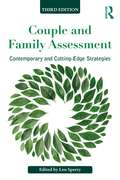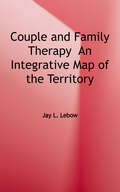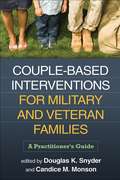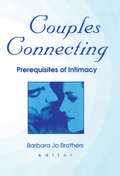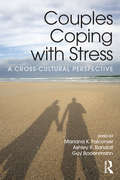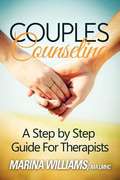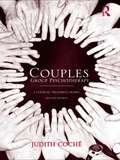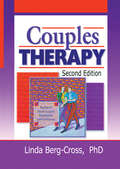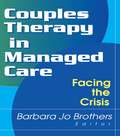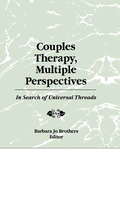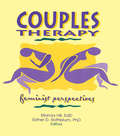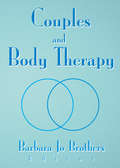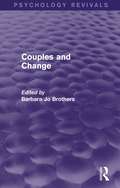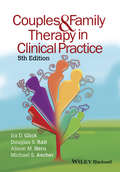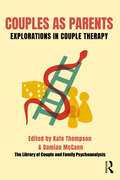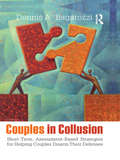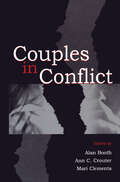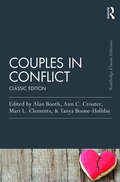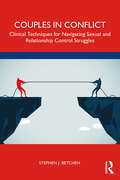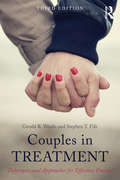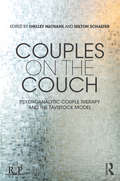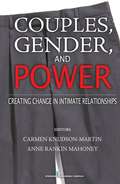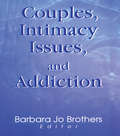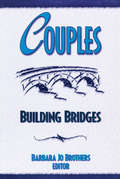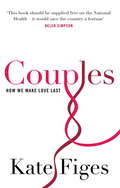- Table View
- List View
Couple and Family Assessment: Contemporary and Cutting‐Edge Strategies (Routledge Series on Family Therapy and Counseling)
by Len SperryThe field of family, child, and couple assessment continues to evolve and change since the first edition of this book appeared in 2004. Couple and Family Assessment, Third Edition, is a thoroughly revised and updated resource for anyone working with children, adolescents, couples, and families. It provides an in-depth description of an even larger number of clinically useful assessment tools and methods, including issue-specific tools, self-report inventories, standardized inventories, qualitative measures, and observational methods. Each chapter provides strategies for systematically utilizing these various assessment methods and measures with a wide range of family dynamics that influence couples and families. These include couples conflict, divorce, separation, mediation, premarital decisions, parenting conflicts, child abuse, family violence, custody evaluation, and child and adolescent conditions, i.e., depression, anxiety, conduct disorder, bipolar disorder, obsessive compulsive disorder, autism, Asperger’s syndrome, and learning disorders that can significantly influence family dynamics. This third edition features the latest, most common and important assessment tools and strategies for addressing problematic clinical issues related to working with families, couples, and children. Chapters 3 through 11 include matrices that summarize pertinent information on all instruments reviewed, allowing readers to instantly compare more than 130 assessment devices. Finally, the book provides extensive clinical case material that illustrates the use of these various assessment tools and strategies in a wide array of clinical situations. Couple and Family Assessment, Third Edition, will be useful to both trainees and practitioners as a ready reference on assessment measures and strategies for working with families, couples, and children.
Couple and Family Therapy: An Integrative Map of the Territory
by Jay L. LeBowWhen selecting treatment for their clients, couple and family therapists are faced with a bewildering array of competing models. On closer inspection, the most effective of these approaches share common elements. This book surveys the state of the science and practice of today's couple and family therapy, looking beyond single models of treatment to instead present an integrative view of the field and its methods of practice. In describing how the field has evolved over the years, Jay Lebow articulates a core set of shared elements from which therapists can shape their own best methods of practice. His pragmatic view assumes that family functioning and problems are multilayered, and he advocates an individualized approach to each family based on what is occurring in the system. Areas of disagreement among couple and family therapists are described; so too are some of the ethical questions and areas of value conflicts that arise in this field of therapy. Readers will come away from this book with a clear sense of when couple and family therapy is the treatment of choice, what is known to work in therapy, and what is still debated.
Couple-Based Interventions for Military and Veteran Families
by Douglas Snyder Candice M. MonsonPresenting couple-based interventions uniquely tailored to the mental health needs of military and veteran couples and families, this book is current, practical, and authoritative. Chapters describe evidence-based interventions for specific disorders such as posttraumatic stress, depression, and substance abuse and related clinical challenges, including physical aggression, infidelity, bereavement, and parenting concerns. Clear guidelines for assessment and treatment are illustrated with helpful case examples; 18 reproducible handouts can be downloaded and printed in a convenient 8 1/2" x 11" size. The book also provides essential knowledge on the culture of military families and the normative transitions and adjustments they face.
Couples Connecting: Prerequisites of Intimacy
by Barbara Jo BrothersHelp clients grow into loving commitment!Making and keeping commitments is more difficult today than ever. About half of all marriages end in divorce, and serial monogamy is not uncommon. Couples Connecting: Prerequisites of Intimacy identifies the cultural and personal attitudes that impede commitment and impair intimacy, and it gives you the therapeutic tools to work with clients who don't know how to build a lasting love.Couples Connecting examines why past theories of self-actualization are now failing. Because our culture emphasizes individualistic values, people do not learn how to create and share bonds with others. Therapists must become developmental partners for clients who need to overcome failures of maturation in order to have successful, loving relationships with their partner. This essential guide offers you practical techniques and case studies, as well the theoretical underpinnings to deal with this crisis of intimacy. Couples Connecting provides specific, insightful studies on overcoming obstacles to genuine commitment, including: identifying patterns of anger in distressed and nondistressed couples ways to help engaged couples overcome the fear of following negative family patterns using family systems theory and psychodynamics to understand developmental issues in marriage suggestions for clinical practice with couples who fear intimacy implications of ten essential factors in intimacyCouples Connecting will help you design and use techniques to promote personal growth and bridge gaps between clients to help couples achieve satisfying and intimate relationships.
Couples Coping with Stress: A Cross-Cultural Perspective (Decade Of Behavior Ser.)
by Guy Bodenmann Ashley K. Randall Mariana K. FalconierThis is the first book that reviews both empirical and clinical applications of how couples jointly cope with stress - dyadic coping - around the globe. The Systemic-Transactional Stress Model (STM), developed by co-editor Guy Bodenmann, is used as a consistent framework so readers can better appreciate the contrasts and similarities across the fourteen cultures represented in the book. Written by scholars from the particular culture, each chapter provides a conceptual review of the dyadic coping research conducted in their specific cultures, and also provides empirical and clinical recommendations. Additional contributions include how to measure dyadic coping, so others can apply the STM model in other contexts. The latest treatment approaches for therapy and prevention are also highlighted, making this book ideal for professionals interested in expanding their cultural competence when working with couples from various backgrounds. Highlights include: -How couples in different cultures deal with stress and how values and traditions affect dyadic stress and coping.-Global applications, especially to couples in the regions highlighted in the book -- the U.S (including one chapter on Latino couples in the U.S.)., Australia, China, Greece, Hungary, Italy, Japan, Kenya, Nigeria, Pakistan, Portugal, Romania, and Switzerland. -Factors encountered in examining dyadic coping using the STM Model including measurement and assessment issues.-Suggestions for making treatment, prevention, and intervention programs for couples more effective. Ideal for relationship researchers, psychologists, mental health counselors, social workers, and advanced students who work with couples dealing with stress. This book is also appropriate for advanced courses on interpersonal processes, close relationships, stress and coping, multicultural issues in marriage and family therapy or counseling, or family systems, taught in a variety of social science disciplines.
Couples Counseling: A Step by Step Guide for Therapists
by Marina WilliamsA session by session guide book for mental health practitioners on how to conduct evidence-based couples counseling. The book guides the therapist step by step through twelve sessions, and covers everything from the very first client phone call all the way through termination.
Couples Group Psychotherapy: A Clinical Treatment Model
by Judith CochéThis book is an up-to-date model based on more than twenty years of work and research with outpatient couples groups. In the text, therapists will find everything they need to conceptualize and develop a successful practice based on group psychotherapy for couples. The book combines tenets of individual personality development, family systems theory, and group psychotherapy theory, blending aspects of the theoretical basis of each in order to build a conceptual framework that incorporates the strengths of all three. Couples Group Psychotherapy also shows clinicians how to use this framework to treat individual clients, how to assess the group’s progress, and how to understand the evolving relationship between participating couples. The model is a cost-effective, time-efficient way to address the needs of diverse communities and uncommon settings, and it harnesses the best of both family and group psychotherapy. Clinicians will come away from this book with a significantly enhanced skillset and a broadened understanding of how to treat couples effectively.
Couples Therapy
by Linda Berg CrossHarness the power of an integrative approach to couples counseling!Why do marriages fail? The behaviorist or cognitive therapist explains that unhappy couples have self-defeating ways of thinking about their spouses and themselves. The sociologically oriented counselor points to the impact of social trends and dramatic changes in child-rearing and social expectations. A therapist oriented toward psychodynamics or systems theory sees the destructive patterns of childhood replayed in the marriage, with spouses taking on rigid roles. The pastoral or humanist counselor believes that partners who cannot experience self-fulfillment through commitment and trust will feel less love and grow more and more disconnected. Couples Therapy, Second Edition, brings together all these points of view to make a unified whole.This integrative approach proposes a new model of successful marriage based on four cornerstones: resiliency, social support, adaptability, and self-fulfillment. Weaving together theory and research, Couples Therapy, Second Edition, explores how common issues can lead to trouble in relationships. It suggests specific interventions so therapists can teach clients to deal with such problem areas as anger management, domestic violence, depression, anxiety, parenting conflicts, in-laws, work pressures, and sexual dissatisfaction. Couples Therapy, Second Edition, offers a sound theoretical framework as well as practical ideas. Through clinical vignettes and up-to-date research, it makes the common conflicts and developmental stages of marriage so understandable that it can be profitably read by clients as well as counselors. Its invaluable resources for the couples therapist include: end-of-chapter professional development questions therapeutic exercises answers to frequently asked professional and ethical questions intervention suggestions for the therapist self-assessment questionnaires book and video recommendations on each chapter topicWritten in clear, readable prose, Couples Therapy, Second Edition, offers practical help for the experienced clinician as well as theoretical overviews for the counselor in training.
Couples Therapy in Managed Care: Facing the Crisis (Journal Of Couples Therapy Ser. #Vol. 8, Nos. 3/4)
by Barbara Jo BrothersCouples Therapy in Managed Care: Facing the Crisis provides social workers, psychologists, and counselors with an overview of the negative effects of the managed care industry on the quality of mental health care. Within this book, you will discover the paradoxes that occur with the mixing of business principals and service principles and find valuable suggestions on how you can creatively cope within the managed care context. With Couples Therapy in Managed Care, you will learn how you can remain true to your own integrity and offer quality services within the current context of today's health care system. Current and comprehensive, Couples Therapy in Managed Care will assist you in easing the dilemma of patients who are suffering from serious physical illness or emotional pain and have little choice or time to search for a needed doctor or service. Couples Therapy in Managed Care offers you informative tips and suggestions on how you can help your clients within the constraints of the managed care system, such as: exploring ways to hold true to your personal values and the integrity of your personal approach to therapy while developing creative strategies to survive within managed care understanding the need to write a treatment plan using high professional standards and a solid theoretical analysis of the proposed therapy to give you a better chance of getting the managed care case manager to authorize your treatments realizing that maintaining a good working relationship with individual case managers will help you get more of your proposed treatments authorized, although their high rate of turnover makes this a daunting task discovering that a sometimes a solution to your problem may be as simple as a phone call to a case manager to negotiate an exception to a standard procedure Couples Therapy in Managed Care offers you effective suggestions to help you overcome the limitations you may encounter while trying to practice within a managed care setting. Innovative and informative, this book will help you provide your patients with the best possible therapy while offering you ways to decrease the stress that managed care systems can cause you and your clients.
Couples Therapy, Multiple Perspectives: In Search of Universal Threads
by Barbara Jo BrothersCouples Therapy, Multiple Perspectives is a springboard from which therapists may begin to answer such questions as What are the ingredients essential to good relationships? What are the ingredients essential to activity within the psychotherapeutic relationship? How can what therapists know regarding psychotherapy be combined to create a whole greater than the sum of its parts? Barbara Jo Brothers aids therapists in answering these and other questions about the basic ingredients, the common denominators, and the universal threads of work with couples from exploring the theories and methods of successful therapists.As there are many ways of looking at couples therapy, this volume encourages therapists to work cooperatively, not competitively, in developing clients’possibilities. Couples Therapy, Multiple Perspectives is intended to assist therapists working with couples achieve a broader view of their work and a richer range of choices in helping their clients. Every article, especially the two by master therapists Florence Kaslow and Maurizio Andolfi, moves readers toward a tapestry of therapeutic possibilities.Features of Couples Therapy, Multiple Perspectives include an in-depth look at the ingredients of a successful marriage, or, what makes marriages work for the long-term by Florence Kaslow; an article by Maurizio Andolfi, translated by Vincenzo DiNicola, which brings together an excellent integration of theories, including those of Bowen, Framo, and Whitaker. Andolfi describes a transgenerational approach to work with couples in crisis, with a case example of the value of doing family-of-origin work in the initial phase of therapy. In an interview segment with Virginia Satir (with Sheldon Starr, PhD, in 1985), she explores how all good therapy has essentially the same ingredients. Readers will find Satir's ideas timeless and thought provoking; indeed they may re-evaluate their own position and theories on therapy with couples.
Couples Therapy: Feminist Perspectives
by Esther D Rothblum Marcia HillHow can you provide effective, meaningful therapy to couples with whom you have little or nothing in common? Couples Therapy: Feminist Perspectives addresses some of the inadequacies, omissions, and assumptions in traditional couples therapy to help you face the issues of race, ethnicity, and sexual orientation in helping couples today. In this book, you'll uncover perspectives that are grounded in an appreciation of cultural context, the effects of privilege, and the centrality of a respectful stance on the part of the therapist. Anyone seeking to do informed and responsive work with couples in distress will find it a useful and valuable compilation.Couples Therapy: Feminist Perspectives describes a variety of feminist approaches to couples therapy--giving you a sense of the range of feminist practice in this area and illustrating approaches you can integrate into your work with couples. Specific topics you'll explore include:cultural considerations in couples therapynarrative approaches to couples therapydilemmas in working with heterosexual couplesworking with lesbian couplesthe particular issues of interracial couplesthe African-American lesbian coupleempathy and mutuality in therapy with couplesWhether you're an experienced psychologist, social worker, marriage and family counselor, or therapist or a student of family and couples therapy, Couples Therapy: Feminist Perspectives will help you prepare to respond effectively to a more diverse clientele.
Couples and Body Therapy
by Barbara Jo BrothersBring the physical dimension into your therapeutic work with couples! This helpful book offers couples therapists new and powerful techniques derived from several body-oriented therapies. This fresh approach can help you identify the hidden conflicts and attitudes of your clients. Couples and Body Therapy offers you exercises, tips, and practical suggestions for helping troubled couples. In Couples and Body Therapy, expert therapists candidly discuss the dangers and benefits of using touch to heal. Their discussion of whether, when, how, and whom to touch clients includes valuable suggestions for working through transference and countertransference, as well as for dealing with hostile clients and obtaining informed consent to touch.Couples and Body Therapy provides thoughtful explorations of the ideas and methods of well-regarded experts--including Virginia Satir, Wilhelm Reich, Alexander Lowen, John Pierrakos, Fritz Perls, Stanley Keleman, and John Gutman--as they apply to the physical expression of emotional states. This book draws from a number of powerful bodywork systems, including: core energetics biodynamic analysis formative psychology Hakomi GestaltUse it to learn the healing skills of body-oriented therapies, including: centering yourself before sessions giving voice to your clients&’ body messages doing effective energy assessments reading posture, gesture, and somatic signals using concentration exercises and grounding techniquesPlentifully illustrated with case studies, Couples and Body Therapy is essential reading for therapists, educators, and students. It offers a repertoire of skills to give you fresh and innovative ways to uncover and heal problems in couples.
Couples and Change (Psychology Revivals)
by Barbara Jo BrothersFirst published in 1996, this enlightening book about facilitating therapeutic change within the couple relationship opens with a transcript of one of a series of lectures by Virginia Satir. It presents readers with Satir’s observations – observations that show the difference between thinking with systems in mind and thinking linearly – of process, interrelatedness and attitudes. Readers will find these and the observations of contributors that follow full of practical application potential. In this title the editor brings together contributors who show how to affect change in couples by explaining dynamics of the male/female relationship and by expanding upon the roles of the therapist. Specifically, contributors give readers information about: Male/female relationships over a 30, 000-year history and how history may have affected present day relationships between men and women Therapists as merely resource providers who facilitate self-discovery and self-solutions The necessity of marital therapy in maintaining stability and change from both systemic-interpersonal and intrapersonal perspectives Psychodynamic, affective and insight-oriented, marital therapy The consultative conversation model and its relationship to the change process in couples therapy Fostering change of psychological (emotional and verbal) abuse Why women leave abusive relationships The use of a specific physical posture for assessing a couple’s interactive style Therapists who work with couples will keep Couples and Change within reach and refer to it often as they help couples develop more healthy, satisfying relationships.
Couples and Family Therapy in Clinical Practice
by Ira D. Glick Michael Ascher Alison M. Heru Douglas S. RaitFifth edition of a classic text that views couples and family therapy through a psychiatric lens Written by clinicians with a biopsychosocial perspective on illness and family dysfunction Draws on case studies to present family-oriented interventions in an accessible manner Explores underlying principles along with a wide range of practical therapeutic techniques Culturally inclusive, enabling readers to work with patients from diverse backgrounds
Couples as Parents: Explorations in Couple Therapy (The Library of Couple and Family Psychoanalysis)
by Kate Thompson Damian McCannCouples as Parents: Explorations in Couple Therapy explores the complex task of parenting from the perspective of the couple relationship.A book for clinicians and parents alike, it describes problems that can occur during the transition to parenthood and the initial decision to have a child to raising young children and adolescents. The book offers a comprehensive exploration of the nature and patterns of intimate partner relationships and how they can be affected by such things as the loss of a baby, raising a child with autism or adoption. Chapters delve into issues unique to same-sex parents and those facing an empty nest. With moving clinical examples, it illustrates how a couple's sex life can be altered on becoming parents and describes how parents can best help their children as they separate. Couples as Parents explains how couple therapy has a unique stance with which to help parents and describes clinical vignettes that demonstrate how parents have been helped in the past.The book considers the historical context of couple relationships, utilises research and psychoanalytic ways of thinking to further understanding for psychotherapists and interested parents, as well as offering a variety of therapeutic approaches to the specific needs of parents, whether as a couple, separated or single.
Couples in Collusion: Short-Term, Assessment-Based Strategies for Helping Couples Disarm Their Defenses (Routledge Series on Family Therapy and Counseling)
by Dennis A. BagarozziWhen a couple enters therapy, both partners have either explicit or implicit understandings of what can—and, more importantly, cannot—be discussed in therapy. Even when empirically tested assessments are used to help pinpoint areas of concern and conflict, couples may choose to identify only those areas that are relatively safe and do not seriously threaten each partner’s sense of integrity and vulnerability. How is a therapist supposed to proceed when a couple comes in for a tune-up, not realizing that their entire transmission needs to be serviced? Therapists know that some relationships, like some transmissions, can continue to function on some level even without proper care—sometimes even for years—before the couple seeks therapy. If, when they come in, the therapist can help the couples to repair and regain their lost equilibrium, they’ll be more likely to seek help when the transmission next begins to slip. In its clear, precise prose, insightful case studies, and thought-provoking discussion questions, Couples in Collusion lays out guidelines for identifying, understanding, and, dealing with the unspoken agreements and collusive systems that couples build up over time. Clinicians will find each chapter replete with concrete strategies they can use in practice as well as thorough explanations of the assessment tools, suggestions on how to use them, and even advice on how to build the tools’ costs into clinicians’ limited budgets.
Couples in Conflict (Penn State University Family Issues Symposia Series)
by Alan Booth Ann C. Crouter Mari ClementsThis volume is based on the presentations and discussions of a national symposium on "Couples in Conflict" that focused on family issues. A common thread throughout is that constructive conflict and negotiation are beneficial for relationships. Together, the chapters provide a foundation for thinking about creative ways in which our society can work to prevent or minimize destructive couple conflict and to enhance couples' abilities to constructively handle their differences. Divided into four parts, this book: *addresses the societal and bioevolutionary underpinnings of couple conflict; *presents the interpersonal roots of couple conflict and the consequences for individuals and couples; *discusses what effects couple conflict have on children and how individual differences in children moderate these effects; and *outlines the issue of policies and programs that address couple conflict. This book concludes with an essay that pulls these four themes together and points to new directions for research and program efforts.
Couples in Conflict: Classic Edition (Psychology Press & Routledge Classic Editions)
by Alan Booth Ann C. Crouter Mari L. Clements Tanya Boone-HolladayThis classic volume provides a solid foundation for thinking about creative ways in which our society can work to prevent or minimize destructive couple conflict and enhance couples' abilities to constructively handle their differences. A common thread throughout is that constructive conflict and negotiation are beneficial for relationships. The new introduction provides an overview of how this classic text is still relevant today. Divided into four parts, this book: *addresses the societal and bio-evolutionary underpinnings of couple conflict; *presents the interpersonal roots of couple conflict and the consequences for individuals and couples; *discusses what effects couple conflict have on children and how individual differences in children moderate these effects; *outlines policies and programs that address couple conflict; and * concludes with an essay that pulls these four themes together and points to new directions for research and program efforts. This book serves as a supplement in graduate or advanced undergraduate courses on interpersonal relationships, couples and/or family and conflict, divorce, couples and/or family therapy taught in human development and family studies, clinical or counseling psychology, social work, sociology, and communications and it is also a helpful compendium for researchers and clinicians/counselors interested in couple conflict.
Couples in Conflict: Clinical Techniques for Navigating Sexual and Relationship Control Struggles
by Stephen J. BetchenIn the first book of its kind, Dr. Stephen J. Betchen teaches established and training marriage and family therapists to recognize the complexity and contradictions of control struggles in couples and, uniquely, how to clinically treat these issues to create a harmonious, long relationship. Integrating conflict theory, psychodynamic systems work, and the basic principles of sex therapy, the book aims to help professionals recognize and assess control struggles in couples, detect and examine their origin, and offer techniques to help break the struggle and alleviate its associated symptoms. Chapters begin by defining control and where the origin of control comes from before exploring how these origins and other sociocultural factors impact how we choose our partners. The book’s second half examines how clinicians should assess and treat couples with both sexual and nonsexual symptoms, how to avoid being caught in the control crossfire as a therapist, and how to terminate sessions and prevent relapses. Filled with case studies and useful interventions throughout, this book aims to help clinicians working with all couples across cultures and sexual orientations find a common ground. It is indispensable for training and graduate clinicians that work with couples, especially couples with sexual disorders.
Couples in Treatment: Techniques and Approaches for Effective Practice
by Gerald R. Weeks Stephen T. FifeThis third edition of Couples in Treatmentcontains all of the desirable qualities of the first and second editions, such as a practical approach and thorough coverage of the many different skills necessary to do couples " therapy well, a readable and accessible writing style, clear and easy to understand explanations, and numerous practical suggestions for improvement in professionals " ability to work with particular populations. Each chapter is revised and all references are updated to reflect current research and the growing body of knowledge about couples " therapy. As always, this book enhances practical applications of information through additional clinical examples, scenarios, and dialogues to illustrate the techniques and concepts presented in the chapters.
Couples on the Couch: Psychoanalytic Couple Psychotherapy and the Tavistock Model (Relational Perspectives Book Series)
by Shelley Nathans and Milton SchaeferCouples on the Couch provides a clear guide to applying the Tavistock model of couple psychotherapy in clinical psychoanalytic practice, offering a compelling sampling of ideas about couple relationships and couple psychotherapy from a broadly relational psychoanalytic perspective. The book provides an in-depth perspective to understanding intimate relationships and the complexities of working in this domain.The chapters and their accompanying discussion also offer a fertile resource of material for readers who have not previously had exposure to the theory and technique of psychoanalytic psychotherapy, as well as offering an expanded and more rigorous approach to those who are already familiar with the Tavistock model. The chapters cover key topics including: unconscious beliefs, forms of couple relating, sex and aging and draw upon the work of Klein, Winnicott and Bion, as well as attachment and object relations theory. The majority of the contributors are affiliated with the Tavistock Centre for Couple Relations (TCCR) in London or The Psychoanalytic Couple Psychotherapy Group in Berkeley, California and make fundamental use of the theoretical model that has been developed at TCCR since the 1940's. Couples on the Couch provides an introduction to the TCCR approach to couple psychotherapy and exposure to the depth and breadth of this framework. Each of the chapters contain in-depth theoretical and clinical case material, presented in tandem with formal discussion, demonstrating how theory may be applied in a variety of clinical encounters and by doing so, deepening the theoretical understanding of the difficulties that beset couples and the challenges posed to those who work with them. The book provides an in-depth perspective to understanding intimate relationships and the complexities of working in this domain. Couples on the Couch will be of great interest to couple psychotherapists and counselors, marriage and family therapists, psychoanalysts, as well as graduate and postgraduate students in psychology, marriage and family therapy, or those in psychoanalytic training programs.
Couples, Gender, and Power: Creating Change in Intimate Relationships
by Carmen Knudson-Martin Anne Rankin MahoneyWhile numerous couples strive for equality in their relationships, many are unaware of the insidious ways in which gender and power still affect them-from their career choices to communication patterns, child-rearing, housework, and more. Written for mental health professionals and others interested in contemporary couple relationships, this research-based book shows how couples are able to move beyond the dangers of gendered inequality and the legacy of hidden male power. <p><p> The book analyzes the relationships of couples from various racial, ethnic, and socioeconomic backgrounds. The contributors present innovative clinical interventions, and suggest strategies therapists can use to help couples transform their relationships from being gender-based to equality-based.
Couples, Intimacy Issues, and Addiction
by Barbara Jo BrothersExplore effective, innovative ways to foster healthy relationships!This thoughtful book discusses fresh and innovative ways to treat partners in distress. It suggests creative therapeutic ways to approach a range of problems and inner needs. Encompassing case studies, theoretical concepts, and original research, Couples, Intimacy Issues, and Addiction offers an intimate glimpse into the painful journey to marital healing.Couples, Intimacy Issues, and Addiction reveals the secret dynamics of marriages in trouble. It offers models for nontraditional relating, insight for handling such devastating crises as adultery, and a fascinating analysis of the marital crisis in the film Eyes Wide Shut. It shows how to use powerfully effective techniques including facilitated imagery, self-psychology, and a phasic model of handling adultery.Couples, Intimacy Issues, and Addiction addresses the tough issues that can shatter a marriage, including: balancing privacy and relatedness handling the intrusive memory of a late spouse facing one partner&’s addiction healing from adultery and other disloyaltiesThough the problems presented in these pages are potentially devastating to any marriage, this book offers an attentive, respectful approach that will be beneficial to both partners. Couples, Intimacy Issues, and Addiction offers solid, tested advice on ways to encourage clients to confront their genuine needs and deal with the ghosts of the past. With these techniques, psychologists, social workers, and couples counselors can help partners on the brink of divorce can build a healthy marriage on a solid foundation of love and trust.
Couples: Building Bridges
by Barbara Jo BrothersCouples: Building Bridges shows therapists how to successfully apply basic principles of human interaction and communication to help facilitate intimate connections between people. Using the approaches in this book, you will see how the bridge between couples materializes naturally as a result of the combination of respect, truth, careful observations, awareness, and shared information.Contributors in Couples: Building Bridges encourage therapists to bring their own behavior into awareness--to see themselves as the major instrument of change in the therapy process and to recognize that work must begin with themselves before starting to work with couples. However, the book stresses that therapy is not something performed on a couple but rather a process geared toward increasing the range of choice of behavior for clients.Therapists working with couples or with individuals seeking therapy concerning their intimate relationships will find Couples: Building Bridges a valuable reference for promoting healthy, open relationships.
Couples: How We Make Love Last
by Kate FigesThese days, many of us enjoy unrivalled freedom and equality when it comes to choosing and building a relationship. Yet new myths about how to live and love compromise that happiness.Kate Figes argues that, whether married or cohabiting, gay or straight, remarried or a couple living apart, the quality of our intimate relationship is fundamental to our long-term health and happiness, because our need for commitment and love hasn't changed.This is not a handbook. There are no easy 'Mars and Venus' universal recipes for success, because relationships are far too complicated, individual and important for easy answers. But learning how others sustain lifelong love, and what really goes on in other people's lives can help us to understand our own partnerships and take responsibility for making them work. Couples is an incisive and important look at how we can learn to make love endure.
